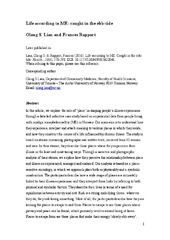Life according to ME: Caught in the ebb-tide
Permanent lenke
https://hdl.handle.net/10037/10355Dato
2016-10-01Type
Journal articleTidsskriftartikkel
Peer reviewed
Sammendrag
In this article, we explore the role of ‘place’ in shaping people’s illness experiences through a data-led inductive case-study based on experiential data from people living with myalgic encephalomyelitis (ME) in Norway. Our main aim is to understand how they experience, interpret and attach meaning to various places in which they reside, and how they construct the course of a life influenced by chronic illness. The study is based on stories containing photographs and written texts, received from 10 women and men. In their stories, they describe those places where they experience their illness in the least and most taxing ways. Through a narrative and photographic analysis of their stories, we explore how they perceive the relationship between place and illness as experienced, managed and endured. Our analysis is based on a place-sensitive sociology, in which we approach place both as physicality and a symbolic construction. The participants describe how a wide range of places are intimately linked to their illness experiences, and they interpret these links by referring to both physical and symbolic factors. They describe their lives in terms of a need for equilibrium between activity and rest. Risk is a strong underlying theme: whatever they do, they risk losing something. Most of all, the participants describe how they are looking for places to escape to and from. Places to escape to are those places where privacy and peace can be found, which primarily revolve around being at home. Places to escape from are those places that make their energy ‘slowly ebb away’.
Beskrivelse
Published version available at https://doi.org/10.1177/1363459315622041


 English
English norsk
norsk